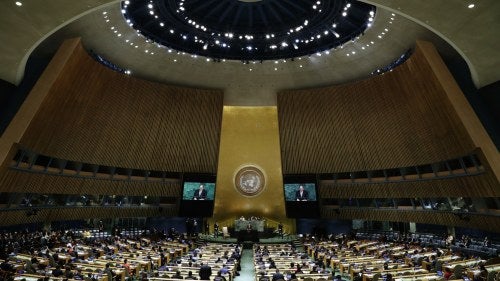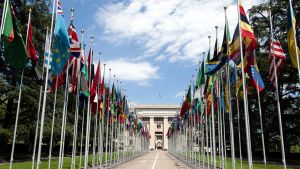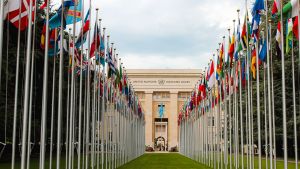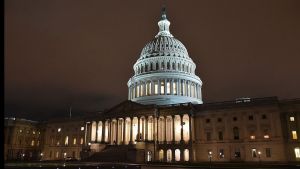Net Favorability of the UN Remains Positive Overall

But recent polling finds key drops among the publics of France, the United Kingdom, and the United States.
Since the Russian invasion of Ukraine, tensions between the permanent members of the UN Security Council (UNSC) have resulted increased debate and meetings. The UNSC has passed fewer resolutions, and just 16 percent of Security Council meetings had a resolution in 2023—a nearly 50-year low.1 This has cast the UNSC’s ability to complete its mission of maintaining international peace and security into doubt, with wars in Ukraine, Gaza, and Sudan frequently appearing on the UN agenda without resolution.
These unresolved conflicts pose a risk to the legitimacy and image of the United Nations among global publics. Pew’s Spring 2024 Global Attitudes Survey of 35 national populations finds that most of the world holds a favorable view of the United Nations, with only five countries’ publics expressing net-negative opinions of the UN. However, views of the UN have declined within the past two years, with particularly sharp drops in key states like the United Kingdom, France, and the United States. While the larger picture generally reveals that overall opinions remain positive, breaking down the data by specific country level yields a more interesting picture of attitudes toward the UN, especially among those states that do not view the UN very favorably.
P3 Favorability of the UN Falls for Second Consecutive Year
The three Western permanent members of the Security Council—the United States, United Kingdom and France, known collectively as the P3—hold uniquely powerful positions within the United Nations. While all three publics overall hold favorable views of the United Nations, opinion among each has trended downward in recent years. The United Kingdom has the highest favorability of the UN among the three (63%), with France and the United States 10 percentage points lower (53% and 52%). Since 2022, though, favorability of the United Nations has decreased among all three publics, but most significantly in the UK, with a 13-percentage point decrease over the past two years. Public opinion of the UN in France and the US has also significantly dropped, by 11 and 9 percentage points, respectively.
These declines could indicate frustration with deadlocked issues like the Russia-Ukraine war and the conflict in the Middle East. Additionally, Pew’s results in the United States also reflect the public’s increasing preference to support a less active role in world affairs, in line with the Chicago Council on Global Affairs’ polling this year.
States with Net-Negative Views Frustrated with UN Inaction or Condemnation
Among the states that have net-unfavorable views of the United Nations, the picture becomes more complex. Relatively few issues unite Turkey, Greece, Japan, Tunisia, and Israel, but all five national publics hold net-negative views of the United Nations. Many of the governments of these states have had difficulties with the United Nations, as the UN has either condemned their actions, failed to resolve an issue specifically affecting them, or been unable to mitigate global crises like climate change.
Turkish opinion currently sits at 33 percent favorable, a 20-year high since it began dropping in 2004 (likely due to a lack of a resolution to the issue of Cyprus after the 2004 unification referendum failed, despite Northern Cyprus voting overwhelmingly for it). Since it hit a low of 17 percent in 2012, though, it has consistently risen, potentially due to Turkey seeking a more active role in world affairs, including the UN, as it aims to make Istanbul a center of UN activity. While frustration due to the UN's lack of action in responding to the conflict in the Middle East could hamper these opinions, especially since the question of Cyprus also remains unresolved, Turks generally feel better about the United Nations than they have in the last two decades.
On the other side of the Cypriot dispute, the Greek public has also registered wavering support in the United Nations, which, despite a general increase between 2012 and 2021, has dipped slightly to 46 percent in 2024 from its peak of 50 percent. Cyprus may also be a key issue driving Greek frustrations, but more recent rhetoric from the Greek representative at the UN has focused on a collective failure to manage climate change and migration, both of which have severely impacted Greece. Additionally, Turkish-Greek disputes over territorial waters in the Aegean Sea flared up in 2022 with Turkey disputing Greece’s sovereignty over islands in the eastern Aegean, reigniting disagreements over the implementation of the UN Convention on the Law of the Sea in this region.
While low, Japanese opinions of the UN have remained mostly steady at 41 percent since 2021. While Japanese opinion recovered after a sharp spike down in 2020, its low opinion could reflect continued frustration with the lack of UN reform, especially as Japan leads one of the major proposals for changing the makeup of the UN Security Council (the G4 initiative with Brazil, Germany, and India).
Tunisian and Israeli favorable opinions of the UN have decreased significantly over the past decade, in line with renewed tensions between the UN and these two states. The UN has recently criticized Tunisia's move away from democracy, and the UN’s response to Israel following the breakout of the Israel-Hamas conflict has heavily impacted Israeli opinions and policy. This has led to the Israeli government blocking the UN Relief and Works Agency—a humanitarian agency focused on Palestinian refugees—from operating in the country.
Views in Sub-Saharan Africa Remain Overwhelmingly Favorable toward the UN
The United Nations is more popular among the rising powers in sub-Saharan Africa, where national publics generally maintain a favorable view of the UN. While Nigerian and South African attitudes decreased from previous polling, Nigerian attitudes remain high (69%), Ghanaian views remained steady (71%), and Kenyan opinion increased 10 percentage points to 80 percent since 2019.
Favoring the United Nations by these margins could be reflective of wanting an increased role in it. Per the Round 10 Afrobarometer survey, released October 16, 2024, three-quarters of Kenyans (76%) agree that African nations should be given greater influence in the decision making of the United Nations. This is true for a number of other sub-Saharan African publics, as Basotho (73%), Beninese (73%), Namibian (68%), and Zimbabwean (74%) populations all have significant majorities favoring a larger role for Africa as well. Guinea is the sole exception among the states Afrobarometer polled in Round 10: only 47 percent of Guineans favor a greater role in the UN for African nations.2
Conclusion
The UN relies on its member states—and the publics within those states—to have the legitimacy to act; without their support, the UN loses funding and relevance in geopolitics. With some populations in Turkey and Japan now viewing the body more negatively due to UN inaction—both on issues particular to their country as well as in Ukraine and in the Middle East—the United Nations will need to find a path forward to regain its legitimacy even as it remains deadlocked on many critical conflicts.


Related Content
 Global Politics
Global Politics
Catherine Bertini discusses President Biden's plans to reshape the role of the US in the United Nations.
 Global Politics
Global Politics
Catherine Bertini and Thomas G. Weiss join Deep Dish to discuss the future of the United Nations and why the United States should lead its renewal.
 Global Politics
Global Politics
This paper provides guidance for new leaders through various stages of the early days of UN leadership.